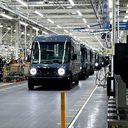Rivian's moment has arrived, and it's a little rocky

Rivian, the most promising automotive startup since Tesla, has exquisite timing: It's ramping up production of game-changing electric pickup trucks and delivery vans just as gas prices are soaring and people are looking for alternatives to fossil fuels.
Yes, but: Rivian's vehicles are also launching into the teeth of unprecedented, industrywide supply chain disruptions that could delay or derail the company's ambitious growth plans.
Why it matters: Whether his timing is perfect, or terrible, Rivian CEO RJ Scaringe's challenge is getting a new electric vehicle brand off the ground while supplying 100,000 promised delivery vans to his company's largest customer and one of its biggest shareholders — Amazon.
- Already, Rivian has conceded that its inexperience is hurting efforts to secure precious semiconductors.
- The microchip shortage, along with other supply-chain constraints, prompted Rivian to cut its 2022 production targets in half, to just 25,000 vehicles.
- The 39-year-old Scaringe, heralded in a 2020 Forbes cover story as Elon Musk's new nemesis, is getting a taste of the kinds of growing pains that the Tesla CEO famously lamented as "production hell."
The big picture: Manufacturing glitches can make new model launches treacherous for any carmaker, especially an inexperienced startup.
- Rivian's challenge is even steeper: it's trying to launch four models almost simultaneously — a pickup, an SUV and two delivery vans.
Scaringe seemed to take all these pressures in stride last week, however, as he drove me in a golf cart around Rivian's 3.4-million-square-foot assembly plant in Normal, Illinois — formerly home to a joint venture between Chrysler and Mitsubishi.
Details: With the flat brim of his Rivian cap pulled low, Scaringe frequently leapt off the cart to offer a closer look at the company's expanding manufacturing operations:
- The six giant stamping presses where aluminum and steel parts are loudly formed.
- The automated body shop where scores of robots weld, rivet and glue auto parts together.
- The pristine paint shop, where trucks and vans do somersaults through a series of giant paint baths.
- The final assembly area, split in two — one line for Rivian trucks and SUVs, another for Amazon's vans — where items like seats, dashboards and steering wheels are added.
The supply chain challenges of the past year have been more pronounced than he expected, Scaringe says, acknowledging some frustration: "We have a plant with 5,000 people but we need the parts here to support it."
- Microchip manufacturers are allocating shipments based on their customers' historical production volumes, he said. That hurts Rivian, which only recently started manufacturing vehicles.
- "I’m on the phone with semiconductor supplier CEOs every day," he says, trying to convince them Rivian will produce the number of vehicles it says it will.
- "It's a day-in, day-out battle for allocation and the number we get is precisely equal to the number of vehicles we build."
The intrigue: Rivian's inexperience may be a disadvantage now, but Scaringe is looking to establish a track record that will secure long-term partnerships with critical EV component makers.
- "Suppliers are trying to figure out who are going to be the dominant players 10 years from now, so they want to build relationships [with companies] that are going to represent significant slices of market share," he explains.
- "A year ago, we were less proven. Today, we’re at the very top of the list, and where we're not at the top, we’re working very hard to get there."
The bottom line: Rivian delivered a grand total of 920 vehicles in 2021 and has 83,000 customer "pre-orders" in hand.
- It's not clear how patient those customers will be, given that other electric pickups from GM and Ford are hitting the market now.
- Meanwhile, Amazon, an expert in fast delivery, is still waiting for its vans.